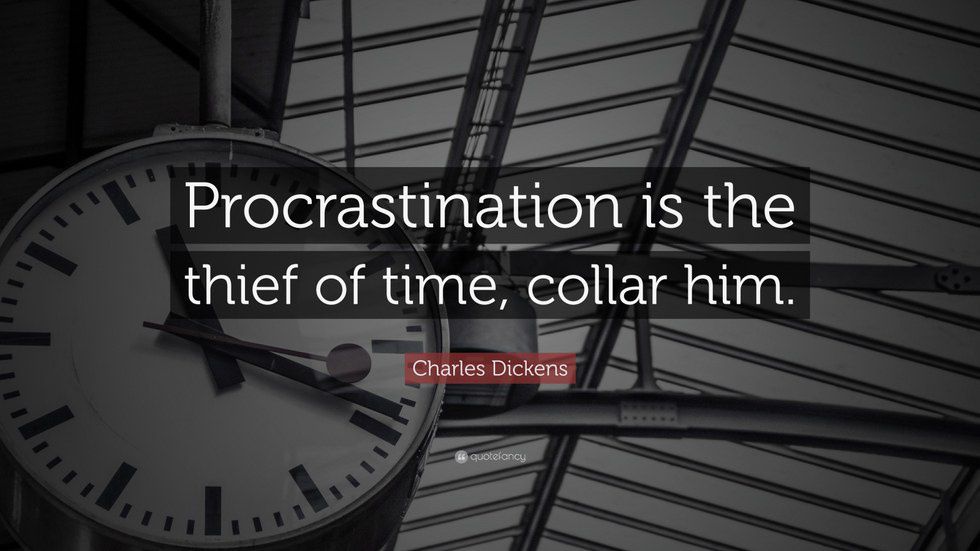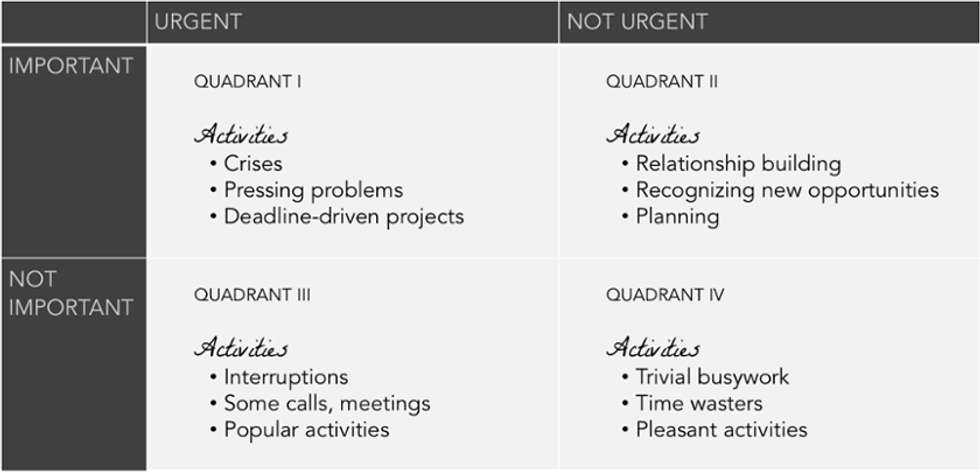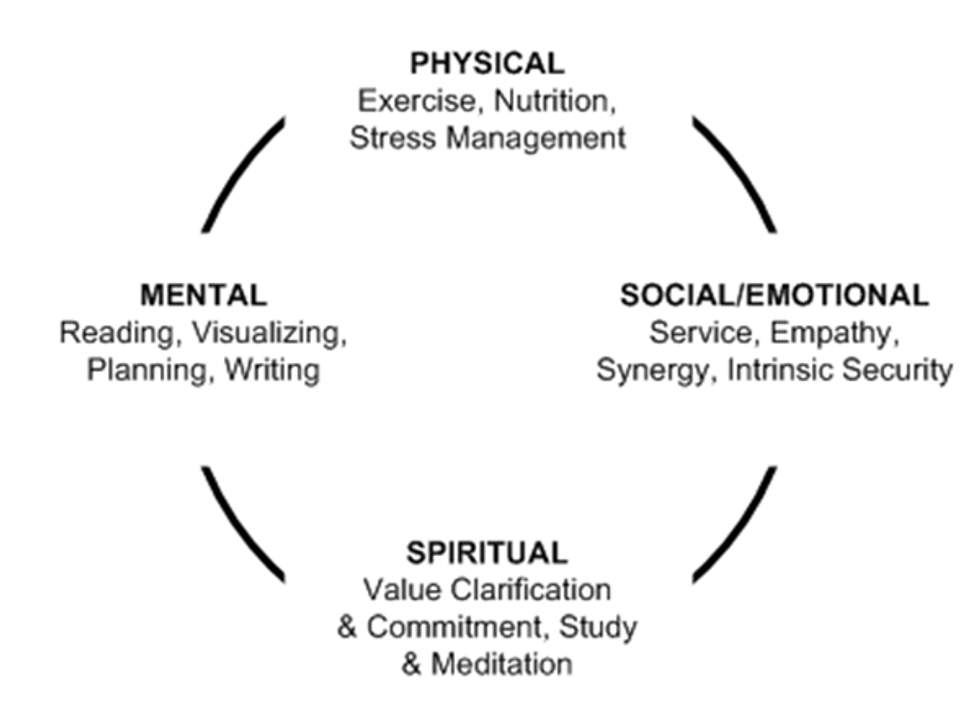If there is one book you should read this semester for your personal growth, it is Stephen Covey's 1989 book The 7 Habits of Highly Effective People. Covey offers seven habits that he thinks are evident in most, if not all, highly effective people. In order to be effective students we must first and foremost be effective people.
Covey's habits also attempt to balance independence with interdependence. He recognizes the importance of being self-sufficient and responsible in a dynamic and interconnected world. Below are the habits found in his book and how they can help us become better people and better students.
1. Be Proactive
As a college student, being proactive is easier said than done. Merriam-Webster defines "proactive" as "acting in anticipation of future problems, needs, or changes". A scenario that immediately comes to mind is that moment that the syllabus is handed out on the first day of class: I see that 15-page paper due the last week of the semester and my first thought is start TODAY.
Yet, I always seem to wait until halfway through the semester to start and I work on it right up until the deadline. I lament how it would have been so much easier if I started sooner when my other classes weren't busy yet. It seems that proactivity's greatest enemy is procrastination. When I start this semester, I am aiming to chip away at my tendency to procrastinate by starting a little sooner on all my projects. We'll see how that goes.
2. Begin With The End In Mind
This habit calls for another difficult task, at least for me: to envision your future so you can make plans to attain that future. For college students, the future is both scary and exciting. If someone had asked me what my future held two years ago, my answer would have been totally different from what it is today. This particular habit, if formed, does not necessarily have to deal with specific aspects of your future. Covey refreshes self-help veterans and introduces new readers to the idea of a personal mission statement—a written constitution declaring your intentions. Everything you do should play into fulfilling your personal mission statement, however vague or specific it may be.
For instance, Oprah Winfrey's personal mission statement is "To be a teacher. And to be known for inspiring my students to be more than they thought they could be." Her mission statement is holistic and possesses an intrinsic goal: to teach. As students, we can strive to help people, to be life-long learners, or to always treat others with respect. With these "ends" in mind, we can grow and form more specific goals as we learn more about ourselves.
3. Put First Things First
If Begin With The End In Mind is concerned with making goals, Habit 3 deals with the act of pursuing those goals. Covey emphasizes that prioritization is necessary, but we should prioritize our actions based on what is most important and not on what is most urgent. Covey's importance vs. urgency distinction is best illustrated below:
This matrix tells us that focusing on crises and deadlines is a priority, but also that non-urgent yet important activities are crucial to a healthy and effective life. This lesson is one that the workaholic in me needs to learn: sometimes impending deadlines need to be put on hold to cultivate relationships and better plan for future challenges. While that Friday night party falls into Quadrant IV, helping a friend in need should take precedent over a deadline. Habit 3 is all about habituating an ability to recognize what should come first and what should come last.
4. Think Win-Win
Habit 4 is the first step to being a successful and interdependent person. The structure of this habit holds an important lesson that students should learn sooner rather than later. Covey postulates that we should all make efforts to create Win-Win scenarios. When dealing with people with whom you may or may not agree with, you should always approach others with the intention of having a mutually beneficial outcome. A word that captures this habit best is compromise. People with Win-Win mentalities are more successful because they can accept that both people winning is overall the best outcome. This mentality demonstrates high courage and high consideration.
One exercise I found that every college student should try might offer some insight into how you deal with others and whether your relationships have room for more compromise. It is as follows:
Identify three important relationships in your life. Think about what you feel the balance is in each of those relationships. Do you give more than you take? Take more than you give? Write down 10 ways to always give more than you take with each one.
5. Seek First To Understand, Then To Be Understood
You’ve spent years of your life learning how to read and write, years learning how to speak. But what about listening?
- Stephen Covey
Covey really speaks to the student in me with this quotation. We have spent the last twenty-something years of our lives honing communication skills: reading, writing, and presenting what we have learned. However, the art of understanding is a habit that takes a lifetime to learn. We crave to be understood as people and intellectuals; we want to give a voice to the issues we care the most about. Before we can be understood, we must first seek to understand.
Covey tells us that our communication skills are demonstrated by:
- our words (10%)
-our sounds (30%)
-our body language (60%)
Our friends and peers do not only discern our listening skills by how we respond. They watch our bodies and hear our sighs of exhaustion. Others can tell how empathetic we are based on how we act more so than what we say. Empathetic listening is the key to understanding others. Others are more likely to be empathetic to your cause if you demonstrate an effort to be empathetic to theirs.
6. Synergize
Perhaps the most abstract of Covey's 7 Habits, this habit of synergy allows others to create new opportunities by being open and cultivating creativity.
synergy (noun): when one plus one equals three or more; when the whole is greater than the sum of its parts.By making habits 1-5, Covey says we can reap benefits even greater than the efforts we put into creating those habits. Synergy comes from seeing the world the way you want it to be (Begin With The End In Mind) and recognizing this world has as much to offer you as you have to offer it. It blooms when we can accept a Win-Win outcome as the best possible outcome. Then it allows us to value the differences in others and improve our outlook on the world (Seek First To Understand, Then To Be Understood). Synergy is the fuel for success that also values the success of others. A college campus is a hot bed for synergy, or it could be if every person aimed to act as if everyone's contribution matters.
7. Sharpen the Saw
The simplest habit is one of the most difficult. Covey explains that there is one asset that we must keep renewing, enhancing, and preserving: ourselves. The first 6 habits are only a fraction of what it takes to be effective students and people. We must sharpen our saw by constantly improving ourselves physically, spiritually, mentally and socially.
In addition to working on these aspects of our lives, we must also strive to give others a "positive script". In an interdependent world, we should inspire others to cultivate habits that will improve their effectivity.
The more we see people in terms of their unseen potential, the more we can use our imagination rather than our memory.
-Stephen Covey
Sharpening the saw is also about seeing the best in others, or as Covey puts it, their "unseen potential". By imagining the greatness in others, we can better imagine the greatness in ourselves.
Young people, especially college students, always have a saw to sharpen. Are you visualizing your goals? Are you serving the people around you? Are you taking care of your body by eating well? Are you studying not just for your academic career, but for your own personal enrichment? These are questions we should ask ourselves every so often. If these questions pique your interest, then you should seriously consider picking up a copy of The 7 Habits of Highly Effective People. The lessons are timeless and will truly help you not only as a person but as a student.
























